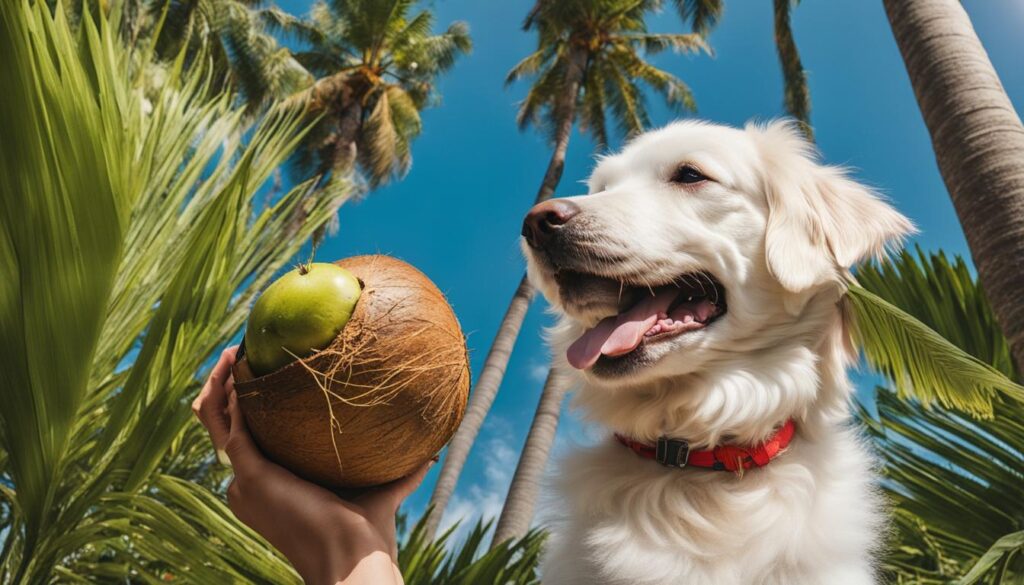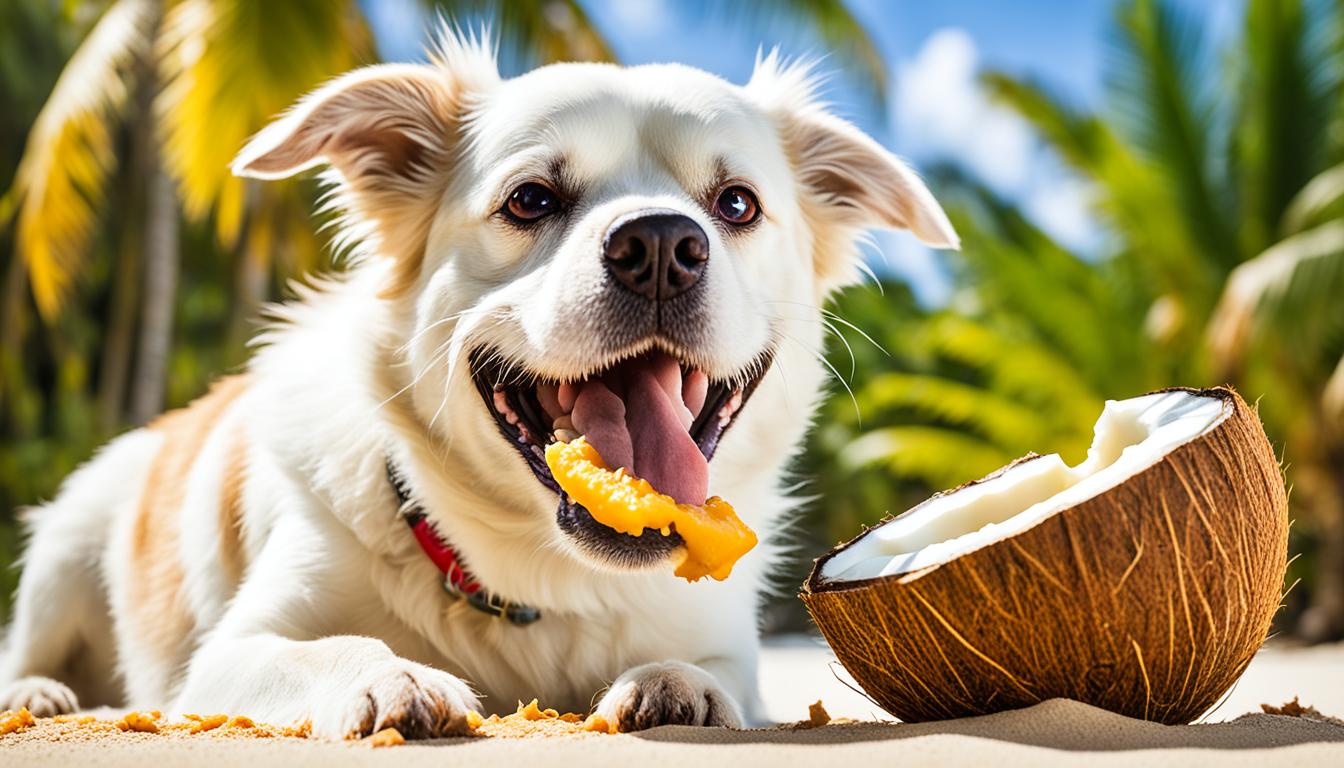As an Amazon Associate I earn from qualifying purchases.
Hey there, dog lovers! Picture this: you’re on a beautiful beach, enjoying the warm sun on your skin and the sound of the waves crashing against the shore. As you sip on a refreshing coconut water, your furry companion runs around, filled with joy and excitement. But have you ever wondered if your dog can enjoy the taste of coconut too?
Coconut has become a trendy superfood for humans, touted for its health benefits and tropical flavor. And naturally, as responsible pet parents, we want to include our canine friends in every delightful experience we have. But when it comes to coconut, we need to dig a little deeper to understand if it’s safe for our furry pals.
So, let’s dive into the world of coconut and find out if dogs can indulge in this tropical treat. Can dogs eat coconut? Is coconut safe for dogs? Stick around as we explore the different aspects of feeding coconut to our beloved four-legged companions.
Key Takeaways:
- Coconut can be enjoyed by dogs, but caution is required due to potential health risks.
- The shell and husk of the coconut are not edible and can cause intestinal blockage and damage.
- Coconut flesh may cause stomach upset and diarrhea in dogs if consumed in large amounts.
- Coconut oil can be given to dogs in small amounts, but there is ongoing debate about its true benefits.
- Coconut water, coconut milk, and coconut treats should be approached with caution, as they may not offer significant benefits beyond a balanced diet.
The Health Benefits of Coconut for Dogs
When it comes to the health benefits of coconut for dogs, the research may be limited, but many dog owners and experts claim that coconut can offer a wide range of positive effects for our furry friends. Coconut is not only a tasty tropical treat but also a source of potential well-being for your canine companion.
Coconut is packed with antioxidants that can help fight off viruses and reduce inflammation in dogs, making it beneficial for those with arthritis or other inflammatory conditions. The lauric acid found in coconut is believed to have anti-inflammatory properties, which can aid in treating various skin conditions like allergies or dry skin.
“Coconut, with its antioxidants and lauric acid, can help fight off viruses, reduce inflammation, and improve skin conditions in dogs.”
But that’s not all. Coconut can also be a source of calories for dogs that need them, such as those who are malnourished or underweight. The healthy fats in coconut can provide an energy boost for your pup. However, due to its high fat content, coconut should be given in moderation, especially for dogs with specific health conditions like pancreatitis or obesity.
While coconut has its benefits, it’s essential to remember that it should not replace a balanced diet specifically formulated for dogs. Prioritize their regular dog food and consult with a veterinarian before incorporating coconut into their routine.
So, whether you’re considering coconut oil, coconut flesh, or coconut treats for your dog, always keep moderation in mind and consult with a professional for personalized advice. Your vet knows your dog’s individual needs best and can guide you towards making the right decisions.
Remember, not all dogs are the same, and what works for one dog may not work for another. Pay attention to your furry companion’s reactions and adjust accordingly to ensure they enjoy all the wonderful benefits coconut has to offer.
And now, let’s explore some other coconut products and important considerations to keep in mind for your furry friend.
References:
- “The Health Benefits of Coconuts for Dogs.” The Spruce Pets, www.thesprucepets.com.
- “Coconut Oil for Dogs: Understanding the Benefits and Risks.” American Kennel Club, www.akc.org.
- “Coconut Oil for Pets: Uses, Benefits, and Tips!” PetMD, www.petmd.com.
Other Coconut Products and Considerations
In addition to coconut flesh and coconut oil, there are other coconut products to consider when it comes to feeding dogs. Coconut water, coconut milk, and coconut treats may catch your eye, but it’s important to understand their benefits and potential drawbacks for your furry friend.
Coconut Water for Dogs
Coconut water has gained popularity as a hydrating beverage for humans, but what about dogs? While coconut water is high in potassium, it doesn’t offer any significant benefits over a balanced diet for dogs. So, there’s no need to pour your pup a refreshing glass of coconut water.
Coconut Milk for Dogs
Coconut milk can be a tempting choice to add some flavor to your dog’s meal. However, it’s important to exercise caution. Coconut milk may contain oils that can upset your dog’s stomach. It’s always best to consult with a veterinarian to determine if coconut milk would be suitable for your dog, especially if they have any specific health conditions.
Coconut Treats and Beyond
Coconut-flavored products like ice cream and desserts may seem like a fun indulgence for your pup, but they should be off-limits. These treats are often high in sugar and may contain harmful additives like xylitol, which is toxic to dogs. Stick to coconut in its natural form or discuss safe coconut treat options with your veterinarian.
When feeding your dog coconut in any form, moderation is key. Coconut should be treated as a special treat rather than a staple in their diet. Remember, a balanced diet formulated for dogs should always be the primary focus.

After exploring the various coconut products for dogs, let’s move on to understanding how to safely incorporate coconut into your dog’s diet.
How to Safely Feed Coconut to Your Dog
When it comes to feeding coconut to your dog, you want to ensure their safety and enjoyment. Here are some tips to help you navigate the world of coconut for your furry friend:
1. Preparation is Key
Never give your dog a whole coconut to eat. The hard shell and husk can pose a choking hazard. Instead, prepare the coconut by baking it in the oven. This will soften the flesh and make it easier to handle.

2. Cut or Grate the Flesh
After baking the coconut, spoon out the flesh from the shell. You can then grate or cut the flesh into smaller, bite-sized pieces. This will make it easier for your dog to chew and digest.
3. Start with Small Amounts
It’s always best to start with small amounts of coconut when introducing it to your dog’s diet. Begin with about ¼ teaspoon for small dogs and gradually increase the serving size if your dog tolerates it well.
4. Monitor for Adverse Reactions
Even natural foods can cause allergies or digestive issues in some dogs. Monitor your dog closely for any adverse reactions after feeding them coconut. If you notice any signs of discomfort, such as vomiting or diarrhea, stop feeding coconut and consult your veterinarian.
5. Treat, Not Replacement
Coconut should be given as a special treat and not as a replacement for a balanced dog diet. Remember that dogs have different nutritional needs, and coconut should not be the main source of their nutrients.
6. Consult with Your Veterinarian
If you have any concerns or questions about feeding coconut to your dog, it’s always best to consult with your veterinarian. They can provide personalized advice based on your dog’s specific needs and health conditions.
Feeding coconut to your dog can be a fun and healthy addition to their diet. Just remember to take the necessary precautions and consult with your veterinarian for the best guidance.
Conclusion
In conclusion, dogs can definitely enjoy the tropical treat of coconut, but it’s important to proceed with caution. While coconut flesh and oil can provide potential health benefits for dogs, such as antioxidant properties and relief from skin conditions, it’s crucial to give them in moderation and consult with your veterinarian.
Coconut water and coconut milk, on the other hand, may not offer significant advantages compared to a well-balanced dog diet. It’s best to prioritize their nutritional requirements and consider coconut as a special treat rather than a regular staple in their meals.
Remember, every dog is unique, so closely monitor their individual reactions when introducing coconut into their diet. Consulting with a veterinarian will provide personalized advice based on your dog’s specific needs and health conditions, ensuring their safety and wellbeing.
With the right precautions and professional guidance, your furry friend can savor the delightful tropical flavors of coconut, reaping its potential benefits while enjoying a tasty treat.
FAQ
Can dogs safely eat coconut?
Is coconut safe for dogs?
Can dogs eat coconut oil?
What are the benefits of coconut for dogs?
Can dogs have coconut water and coconut milk?
How should I feed coconut to my dog?
Source Links
- https://soopapets.com/blogs/dog-health/why-is-coconut-good-for-dogs
- https://www.dailypaws.com/dogs-puppies/dog-nutrition/what-can-dogs-eat/can-dogs-eat-coconut
- https://www.trustedhousesitters.com/blog/pets/can-dogs-eat-coconut/
As an Amazon Associate I earn from qualifying purchases.

